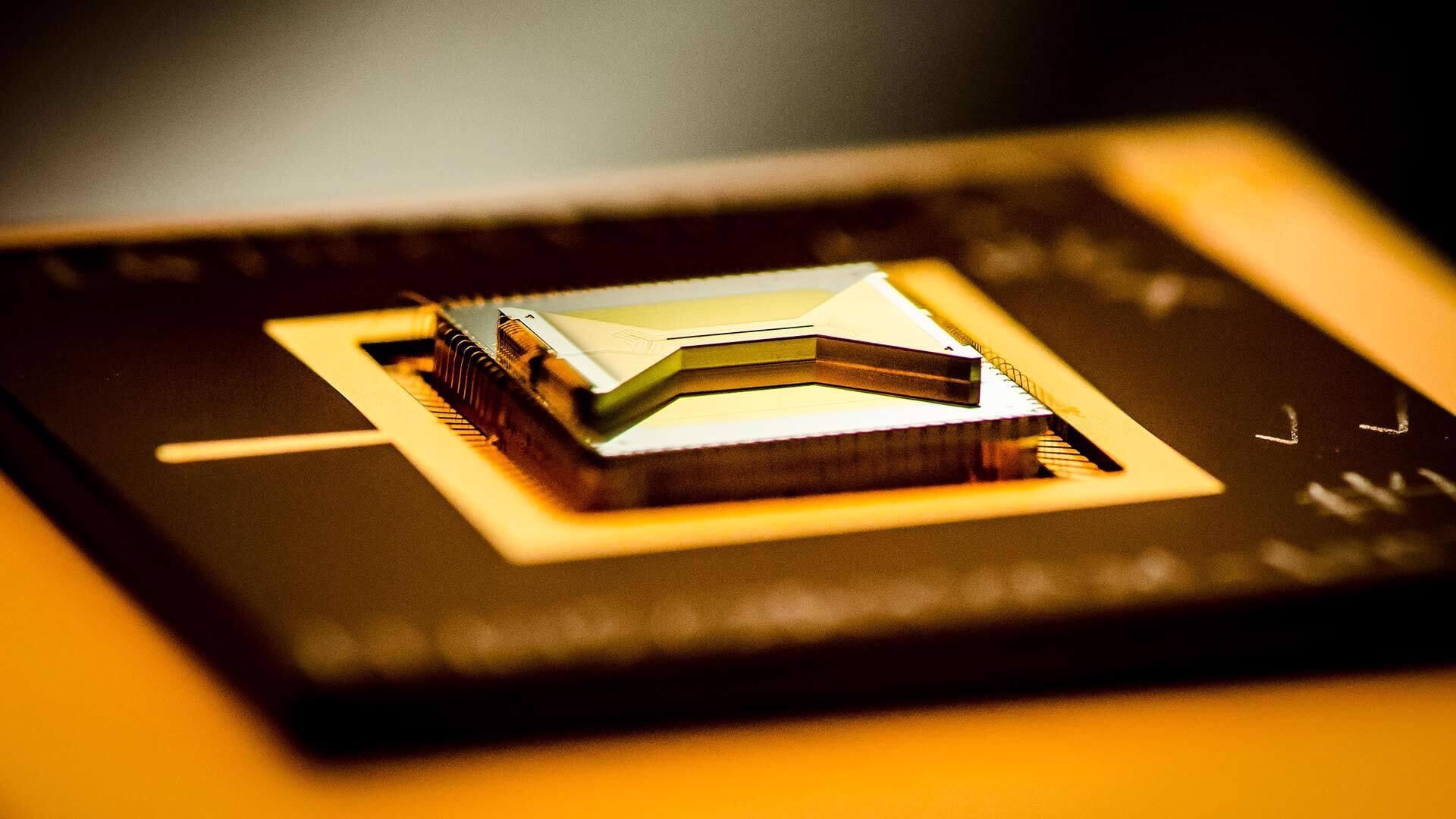Nothing is perfect, not even the indifferent, calculating bits that make up the basis of computers. But for the first time, a collaborative team that includes University of Maryland (UMD) scientists has shown that an assembly of quantum computing pieces can be better than the shakiest individual components used to build it.
 A computer chip contains an ion trap that researchers use to capture and control atomic ion qubits. New findings from a team including UMD researchers show that qubits can work together as a single "logical qubit" to reduce errors. Image Credit: Kai Hudek/JQI
A computer chip contains an ion trap that researchers use to capture and control atomic ion qubits. New findings from a team including UMD researchers show that qubits can work together as a single "logical qubit" to reduce errors. Image Credit: Kai Hudek/JQI
The research team that includes Christopher Monroe, a fellow of the Joint Quantum Institute and a College Park Professor of Physics, together with other UMD researchers and colleagues from Duke University, shared how they took this revolutionary step toward dependable, practical quantum computers in a paper published recently in the journal Nature.
In their experiment, the team joined together several qubits — the quantum version of bits that encrypt data in standard computers as zeros and ones — to work together as one unit. This “logical qubit” is established on a quantum error correction code that can spot and rectify an error that happens in one of the 13 individual qubits that make up the logical qubit “team.”
Furthermore, the design of the logical qubit is fault-tolerant — that is, can contain errors to diminish their negative effects.
The demonstration strengthens the great potential of quantum computers, which are supposedly capable of functioning beyond the range of standard or “classical” computers, in part because qubits are much more versatile than standard bits, and not restricted to merely being zero or one.
Yet, quantum faults have long hindered the effort to expand these futuristic technologies to superior levels of power; unlike transistors that encode data in standard computer chips, a qubit is vulnerable to errors from minute environmental disturbances like a temperature change or vibration that ruins its quantum state.
A group of qubits that function in unison can help surpass such limits, however, said Monroe. Monroe is also co-founder and chief scientist at IonQ, a quantum company in College Park that is established partly on the technology he created as a UMD scientist.
Qubits composed of identical atomic ions are natively very clean by themselves. However, at some point, when many qubits and operations are required, errors must be reduced further, and it is simpler to add more qubits and encode information differently. The beauty of error correction codes for atomic ions is they can be very efficient and can be flexibly switched on through software controls.
Christopher Monroe, Fellow, Joint Quantum Institute
For the first time, a logical qubit has been demonstrated to be more dependable than the most error-prone step necessary to make it. The experiment showed that the team could verify that it correctly formed the logical qubit in a preferred quantum state 99.4% of the time, compared to the estimated 98.9% success rate of the six quantum processes (known as quantum operations) that they employed to create it.
That may not seem like a significant difference, but it is a vital step in the quest to design much bigger quantum computers.
If the six quantum operations were assembly line workers, each concentrated on one task, the joint error rate of the workers would result in the line only creating beneficial products 93.6% of the time, much lower than the 99.4% efficacy rate when the “workers” cooperate to reduce the chance of quantum errors compounding and tarnishing the outcome.
Although it may appear wasteful to employ so many separate qubits and steps simply to make something work as a single qubit, the distinctive computational functions of quantum computers could make logical qubits a minor cost to bear.
If quantum computers can be made reliable, they will be robust tools capable of computations projected to transform sectors including security, healthcare and finance.
The results were realized using Monroe’s ion-trap system at UMD, which employs up to 32 individual charged atoms — ions — that are cooled with lasers and suspended over electrodes on a chip. The ions can then be employed as qubits through additional laser tweaks.
We have 32 laser beams. And the atoms are like ducks in a row; each with its own fully controllable laser beam. I think of it like the atoms form a linear string and we're plucking it like a guitar string. We're plucking it with lasers that we turn on and off in a programmable way. And that's the computer; that's our central processing unit.
Christopher Monroe, Fellow, Joint Quantum Institute
By effectively developing a fault-tolerant logical qubit with this system, the scientists have demonstrated that meticulous, creative designs have the potential to unleash quantum computing from the limitation of the unavoidable errors of the existing state of the art.
What's amazing about fault tolerance, is it's a recipe for how to take small unreliable parts and turn them into a very reliable device. And fault-tolerant quantum error correction will enable us to make very reliable quantum computers from faulty quantum parts.
Kenneth Brown, Study Co-Author and Professor of Electrical and Computer Engineering, Duke University
Besides Monroe and Brown, the paper’s co-authors are JQI graduate student Laird Egan; JQI graduate students Andrew Risinger, Daiwei Zhu, and Debopriyo Biswas; JQI research scientist Marko Cetina; Duke postdoctoral researchers Crystal Noel and Michael Newman; Duke University physics graduate student Dripto M. Debroy; and Georgia Institute of Technology graduate student Muyuan Li.
Source: https://umd.edu